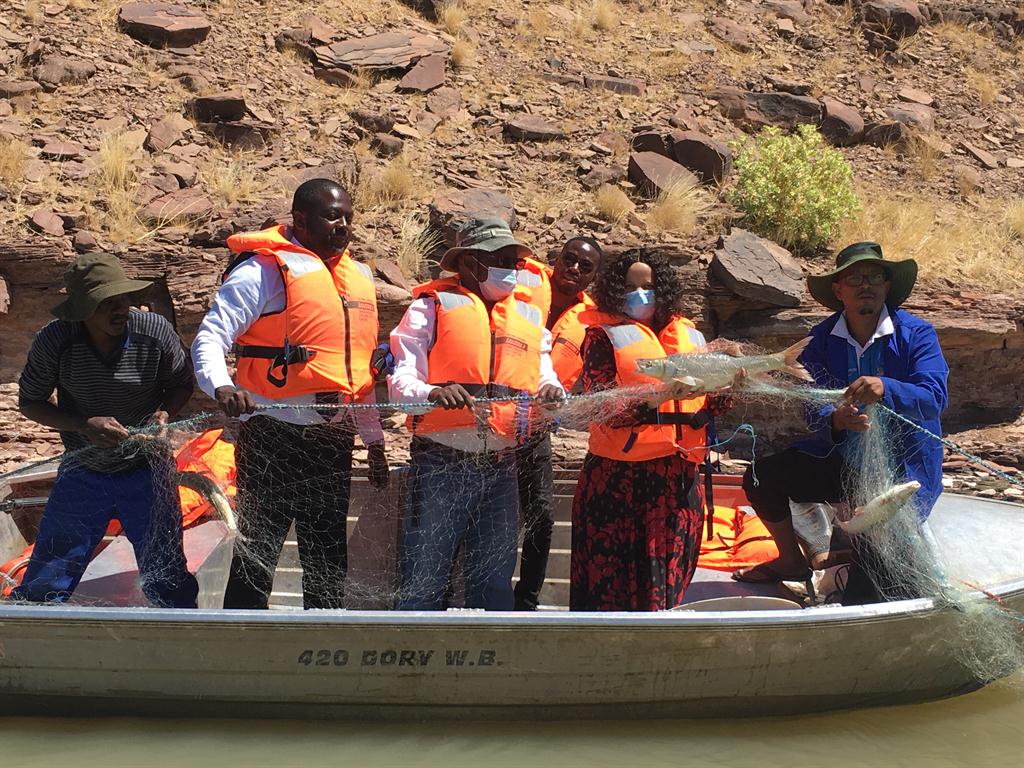Marginalised communities included in Neckartal project
ELIZABETH JOSEPH
KEETMANSHOOP
A Fisheries and Aquaculture Research Project, launched at the Neckartal Dam last week, is set to rejuvenate the livelihoods of marginalised communities as well as those in surrounding areas.
Spearheaded by the fisheries ministry, the project will be undertaken in partnership with the United Nations Food and Agriculture Organisation (FAO).
According to the FAO, earlier this year, the ministry asked for assistance during an investigation of the sustainability of the project.
In a speech by FAO representative to Namibia, Farayi Zimudzi, the organisation provided technical assistance to investigate the potential of fisheries and aquaculture at the dam.
"The organisation responded positively and developed a technical cooperation project, which includes the provision of equipment, technical expertise and capacity development support.
“The research project is expected to culminate into key outputs including a feasibility study report and an environmental risk assessment report," assistant representative, Ferdinand Mwaapopi, said on Zimudzi's behalf.
They added that the project is expected to raise awareness on fisheries and aquaculture on the dam for the surrounding communities as well as nationally.
"This research project is well aligned with a larger project FAO is supporting in the fisheries ministry where we have collectively developed a national plan of action for small-scale fisheries," Zimudzi said.
Empowering communities
The project is set to empower marginalised and vulnerable communities through improved participation in the fisheries sector.
Still in its idealisation stage, the project will officially kick off in 2022.
Zimudzi added that there is no doubt that small-scale artisanal fishers, fish farmers and fish workers hold enormous potential to promote transformative changes in production, processing, distribution and consumer patterns of fish and aquatic products, contributing to healthy and diverse diets, livelihoods, community prosperity and traditional culture.
The project highlighted some positive and negative impacts on the aquatic systems fisheries and aquaculture, as well as mitigation and management measures for conservation and sustainable use of fisheries resources.
According to //Karas governor Aletha Fredericks, the regional council is excited to work with the ministry in assuring that the research project is a success.
"This project will be one that will create a lot of job opportunities for locals and I strongly encourage entrepreneurs and farmers wishing to establish farming businesses to consider integrated farming activities, involving both agriculture and aquaculture.
“Approximately 30 000 people are supported by small-scale fishing,” she said.
“Women and youth should also be empowered and taught how to catch, process, and market fish. Infrastructure should also be built that can assist in these training opportunities. My office will be more than willing to assist in that regard." Fredericks added.
KEETMANSHOOP
A Fisheries and Aquaculture Research Project, launched at the Neckartal Dam last week, is set to rejuvenate the livelihoods of marginalised communities as well as those in surrounding areas.
Spearheaded by the fisheries ministry, the project will be undertaken in partnership with the United Nations Food and Agriculture Organisation (FAO).
According to the FAO, earlier this year, the ministry asked for assistance during an investigation of the sustainability of the project.
In a speech by FAO representative to Namibia, Farayi Zimudzi, the organisation provided technical assistance to investigate the potential of fisheries and aquaculture at the dam.
"The organisation responded positively and developed a technical cooperation project, which includes the provision of equipment, technical expertise and capacity development support.
“The research project is expected to culminate into key outputs including a feasibility study report and an environmental risk assessment report," assistant representative, Ferdinand Mwaapopi, said on Zimudzi's behalf.
They added that the project is expected to raise awareness on fisheries and aquaculture on the dam for the surrounding communities as well as nationally.
"This research project is well aligned with a larger project FAO is supporting in the fisheries ministry where we have collectively developed a national plan of action for small-scale fisheries," Zimudzi said.
Empowering communities
The project is set to empower marginalised and vulnerable communities through improved participation in the fisheries sector.
Still in its idealisation stage, the project will officially kick off in 2022.
Zimudzi added that there is no doubt that small-scale artisanal fishers, fish farmers and fish workers hold enormous potential to promote transformative changes in production, processing, distribution and consumer patterns of fish and aquatic products, contributing to healthy and diverse diets, livelihoods, community prosperity and traditional culture.
The project highlighted some positive and negative impacts on the aquatic systems fisheries and aquaculture, as well as mitigation and management measures for conservation and sustainable use of fisheries resources.
According to //Karas governor Aletha Fredericks, the regional council is excited to work with the ministry in assuring that the research project is a success.
"This project will be one that will create a lot of job opportunities for locals and I strongly encourage entrepreneurs and farmers wishing to establish farming businesses to consider integrated farming activities, involving both agriculture and aquaculture.
“Approximately 30 000 people are supported by small-scale fishing,” she said.
“Women and youth should also be empowered and taught how to catch, process, and market fish. Infrastructure should also be built that can assist in these training opportunities. My office will be more than willing to assist in that regard." Fredericks added.





Comments
Namibian Sun
No comments have been left on this article